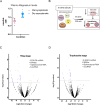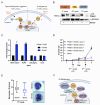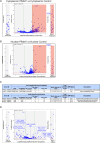RNA polymerase III is involved in regulating Plasmodium falciparum virulence
- PMID: 38921824
- PMCID: PMC11208047
- DOI: 10.7554/eLife.95879
RNA polymerase III is involved in regulating Plasmodium falciparum virulence
Abstract
While often undetected and untreated, persistent seasonal asymptomatic malaria infections remain a global public health problem. Despite the presence of parasites in the peripheral blood, no symptoms develop. Disease severity is correlated with the levels of infected red blood cells (iRBCs) adhering within blood vessels. Changes in iRBC adhesion capacity have been linked to seasonal asymptomatic malaria infections, however how this is occurring is still unknown. Here, we present evidence that RNA polymerase III (RNA Pol III) transcription in Plasmodium falciparum is downregulated in field isolates obtained from asymptomatic individuals during the dry season. Through experiments with in vitro cultured parasites, we have uncovered an RNA Pol III-dependent mechanism that controls pathogen proliferation and expression of a major virulence factor in response to external stimuli. Our findings establish a connection between P. falciparum cytoadhesion and a non-coding RNA family transcribed by Pol III. Additionally, we have identified P. falciparum Maf1 as a pivotal regulator of Pol III transcription, both for maintaining cellular homeostasis and for responding adaptively to external signals. These results introduce a novel perspective that contributes to our understanding of P. falciparum virulence. Furthermore, they establish a connection between this regulatory process and the occurrence of seasonal asymptomatic malaria infections.
Keywords: P. falciparum; infectious disease; malaria; microbiology; ncRNA; var genes; virulence.
© 2024, Diffendall et al.
Conflict of interest statement
GD, AC, AB, PN, FD, MS, DL, AC, AS No competing interests declared
Figures










Update of
- doi: 10.1101/2023.07.18.549525
- doi: 10.7554/eLife.95879.1
- doi: 10.7554/eLife.95879.2
Similar articles
-
Exonuclease-mediated degradation of nascent RNA silences genes linked to severe malaria.Nature. 2014 Sep 18;513(7518):431-5. doi: 10.1038/nature13468. Epub 2014 Jun 29. Nature. 2014. PMID: 25043062
-
Ectopic overexpression of Plasmodium falciparum DNA-/RNA-binding Alba proteins misregulates virulence gene homeostasis during asexual blood development.Microbiol Spectr. 2025 Mar 4;13(3):e0088524. doi: 10.1128/spectrum.00885-24. Epub 2025 Jan 27. Microbiol Spectr. 2025. PMID: 39868986 Free PMC article.
-
Selective upregulation of a single distinctly structured var gene in chondroitin sulphate A-adhering Plasmodium falciparum involved in pregnancy-associated malaria.Mol Microbiol. 2003 Jul;49(1):179-91. doi: 10.1046/j.1365-2958.2003.03570.x. Mol Microbiol. 2003. PMID: 12823820
-
Variant antigens of Plasmodium falciparum encoded by the var multigenic family are multifunctional macromolecules.Res Microbiol. 2001 Mar;152(2):141-7. doi: 10.1016/s0923-2508(01)01184-6. Res Microbiol. 2001. PMID: 11316367 Review.
-
Deciphering the export pathway of malaria surface proteins.Trends Parasitol. 2006 Sep;22(9):401-4. doi: 10.1016/j.pt.2006.07.002. Epub 2006 Jul 14. Trends Parasitol. 2006. PMID: 16843728 Review.
References
-
- Abraham KJ, Chan JNY, Salvi JS, Ho B, Hall A, Vidya E, Guo R, Killackey SA, Liu N, Lee JE, Brown GW, Mekhail K. Intersection of calorie restriction and magnesium in the suppression of genome-destabilizing RNA-DNA hybrids. Nucleic Acids Research. 2016;44:8870–8884. doi: 10.1093/nar/gkw752. - DOI - PMC - PubMed
-
- Andrade CM, Fleckenstein H, Thomson-Luque R, Doumbo S, Lima NF, Anderson C, Hibbert J, Hopp CS, Tran TM, Li S, Niangaly M, Cisse H, Doumtabe D, Skinner J, Sturdevant D, Ricklefs S, Virtaneva K, Asghar M, Homann MV, Turner L, Martins J, Allman EL, N’Dri M-E, Winkler V, Llinás M, Lavazec C, Martens C, Färnert A, Kayentao K, Ongoiba A, Lavstsen T, Osório NS, Otto TD, Recker M, Traore B, Crompton PD, Portugal S. Increased circulation time of Plasmodium falciparum underlies persistent asymptomatic infection in the dry season. Nature Medicine. 2020;26:1929–1940. doi: 10.1038/s41591-020-1084-0. - DOI - PubMed
MeSH terms
Substances
Grants and funding
LinkOut - more resources
Full Text Sources

